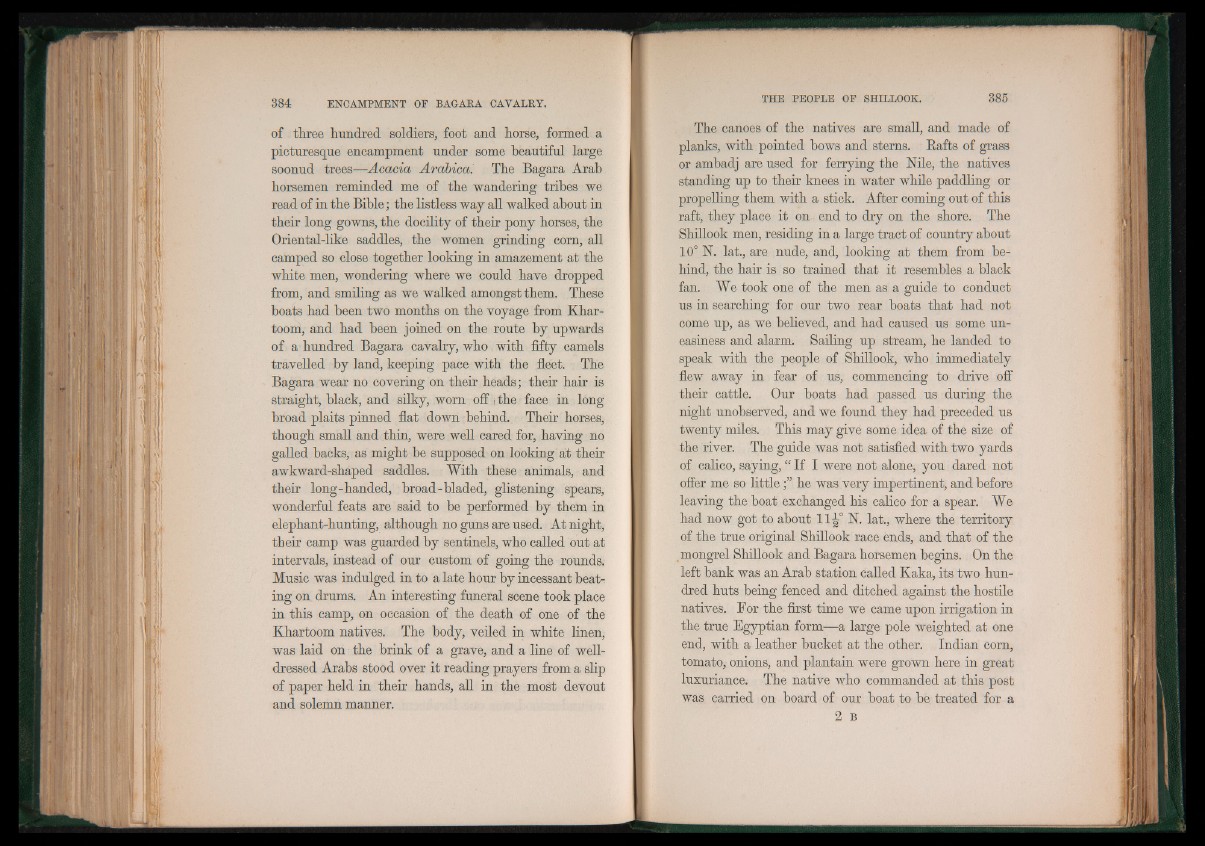
of three hundred soldiers, foot and horse, formed a
picturesque encampment under some beautiful large
soonud trees—Acacia Ardbica. The Bagara Arab
horsemen reminded me of the wandering tribes we
read of in the Bible; the listless way all walked about in
their long gowns, the docility of their pony horses, the
Oriental-like saddles, the women grinding corn, all
camped so close together looking in amazement at the
white men, wondering where we could have dropped
from, and smiling as we walked amongst them. These
boats had been two months on the voyage from Khar-
toom, and had been joined on the route by upwards
of a hundred Bagara cavalry, who with fifty camels
travelled by land, keeping pace with the fleet. The
Bagara wear no covering on their heads; their hair is
straight, black, and silky, worn off ¡the face in long
broad plaits pinned flat down behind. Their horses,
though small and thin, were well cared for, having no
galled backs, as might be supposed on looking at their
awkward-shaped saddles. With these animals, and
their long-handed, broad -bladed, glistening spears,
wonderful feats are said to be performed by them in
elephant-hunting, although no guns are used. At night,
their camp was guarded by sentinels, who called out at
intervals, instead of our custom of going the rounds.
Music was indulged in to a late hour by incessant beating
on drums. An interesting funeral scene took place
in this camp, on occasion of the death of one of the
Khartoom natives. The body, veiled in white linen,
was laid on the brink of a grave, and a line of well-
dressed Arabs stood over it reading prayers from a slip
of paper held in their hands, all in the most devout
and solemn manner.
The canoes of the natives are small, and made of
planks, with pointed bows and stems. Rafts of grass
or ambadj are used for ferrying the Nile, the natives
standing up to their knees in water while paddling or
propelling them with a stick. After coming out of this
raft, they place it on end to dry on the shore. The
Shillook men, residing in a large tract of country about
10° N. lat., are nude, and, looking at them from behind,
the hair is so trained that it resembles a black
fan. We took one of the men as a guide to conduct
us in searching for our two rear boats that had not
come up, as we believed, and had caused us some uneasiness
and alarm. Sailing up stream, he landed to
speak with the people of Shillook, who immediately
flew away in fear of us, commencing to drive off
their cattle. Our boats had passed us during the
night unobserved, and we found they had preceded us
twenty miles. This may give some idea of the size of
the river. The guide was not satisfied with two yards
of calico, saying, “ If I were not alone, you dared not
offer me so l i t t l e h e was very impertinent, and before
leaving the boat exchanged his calico for a spear. We
had now got to about 11-^° N. lat., where the territory
of the true original Shillook race ends, and that of the
mongrel Shillook and Bagara horsemen begins. On the
left bank was an Arab station called Kaka, its two hundred
huts being fenced and ditched against the hostile
natives. For the first time we came upon irrigation in
the true Egyptian form—a large pole weighted at one
end, with a leather bucket at the other. Indian com,
tomato, onions, and plantain were grown here in great
luxuriance. The native who commanded at this post
was carried on board of our boat to be treated for a
2 B